It’s so quiet here today. A group of kids came in to eat lunch and then they were off to school again. It seems strange and unnatural, but it is so necessary. Working with street children is overwhelming. Nega describes it as the hardest thing he’s ever done and he’s had some hard jobs...
Aster's New Life
Stones of Significance: A Time to Remember
Seeing is believing: A ‘Desse-Transformation’
Small Investment: Huge Returns
"I experienced first hand that a small financial contribuiton produces large results when placed in God's hands." - Heather McGugan "Speak up for those who cannot speak for themselves, for the rights of all who are destitute. Speak up and judge fairly; defend the rights of the poor and needy."
Proverbs 31:8-9
The Nega Update - on staff, children (even Desse!), foster care...
Each week I, Joe Bridges, talk with Nega Meaza, Director of Onesimus, to discuss important matters affecting him, the ministry, and the children both TFC and Onesimus exist for. I am often privy to some very encouraging news on such calls that I would like to start sharing with you each month. These updates will be brief, containing only the details I have a chance to hear in my limited time with Nega, but I hope you will be able to see in them the undeniable hope that TFC and Onesimus are bringing to the street children of Ethiopia.
Staff:
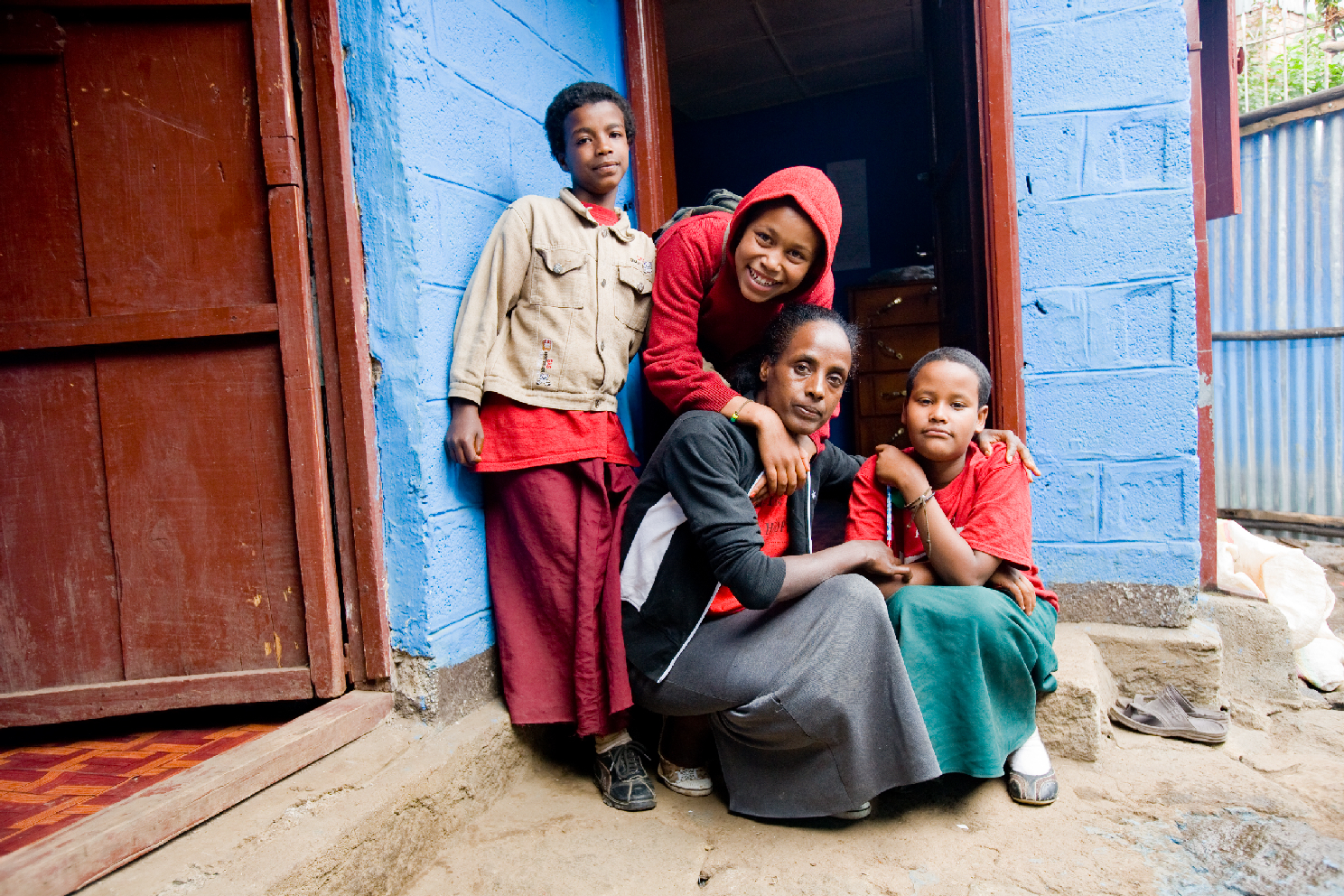 |
|
| Fitela with her girls - she is the house mother for the girls |
Fitela (House Mother and Cook) – I am so impressed by Fitela. Her name can be associated with almost all of the following stories of children coming to Christ, changing their behaviors, and growing. Fitela prays so diligently for all of the children and really commits herself to teaching them about the Lord. Praise God for such a wonderful woman working with Onesimus.
Seblay (Social Worker) – Seblay joined the Onesimus staff recently and she is extremely beneficial to Nega and to the children we work with. She officially started work at Onesimus last week, but prior to that she was volunteering. I am excited to have her working with us – she obviously loves the children from her heart and her social work skills are such a necessity. Changing Children: Meaza left the Halfway Home several weeks ago. At that time she seemed unemotional and desperate to be free from the home, Fitela, and structure. She came back to the Halfway Home after being gone for only a week. She came back in tears and very repentant. Since her return, she has been doing great.
 |
|
| Desse Today |
Desse is doing really well. He even said he wants to go to his family in Gondor after seeing all of the other family reintegrations that took place over the Summer. Nega told him that if he stays in the Halfway Home and finishes a year of school then he can go to his family in Gondor. Nega sounds very hopeful that this will happen. Could you imagine Desse off of the streets for good? That would be such a tremendous testimony. Let’s pray for that. For those who do not know, Desse was Onesimus’s original beneficiary and has been on again off again in the ministry for over 3 years.
Halfway Home Family Visitations: Metu went to visit her grandmother and younger sister. Her grandmother was so poor when Metu’s mother died that she brought Metu to Addis Ababa and left her to “grow by chance,” which is a common cultural concept. Metu expressed how grateful she was to see her grandmother and sister after over 4 years of separation.
 |
|
| Metu (right) with her sister and grandmother in August |
Nebiyu went with Nega to visit his mother. Nega said he was so surprised to see how excited both Nebiyu and his mother were to see each other (their history is not a good one). Nebiyu stayed the weekend with his mother and then returned to the Halfway Home on Monday.
Abi went to visit his mother and sisters. Nega said that the situation is so confusing because as good as Abi’s family seems, he is still unwilling to stay with them more than a few days. Nega said that it seems Abi is very affected by all the time he has spent on the streets, sometimes acting crazy, but that he is a brilliant student.
Yohannes (see last month's blog about him), who was reintegrated into his family this month, and his mother came to Addis Ababa to finish the process of transferring his school records. Nega said that Yohannes was doing very good and was still excited to be home with his family. Drop-In Center News:
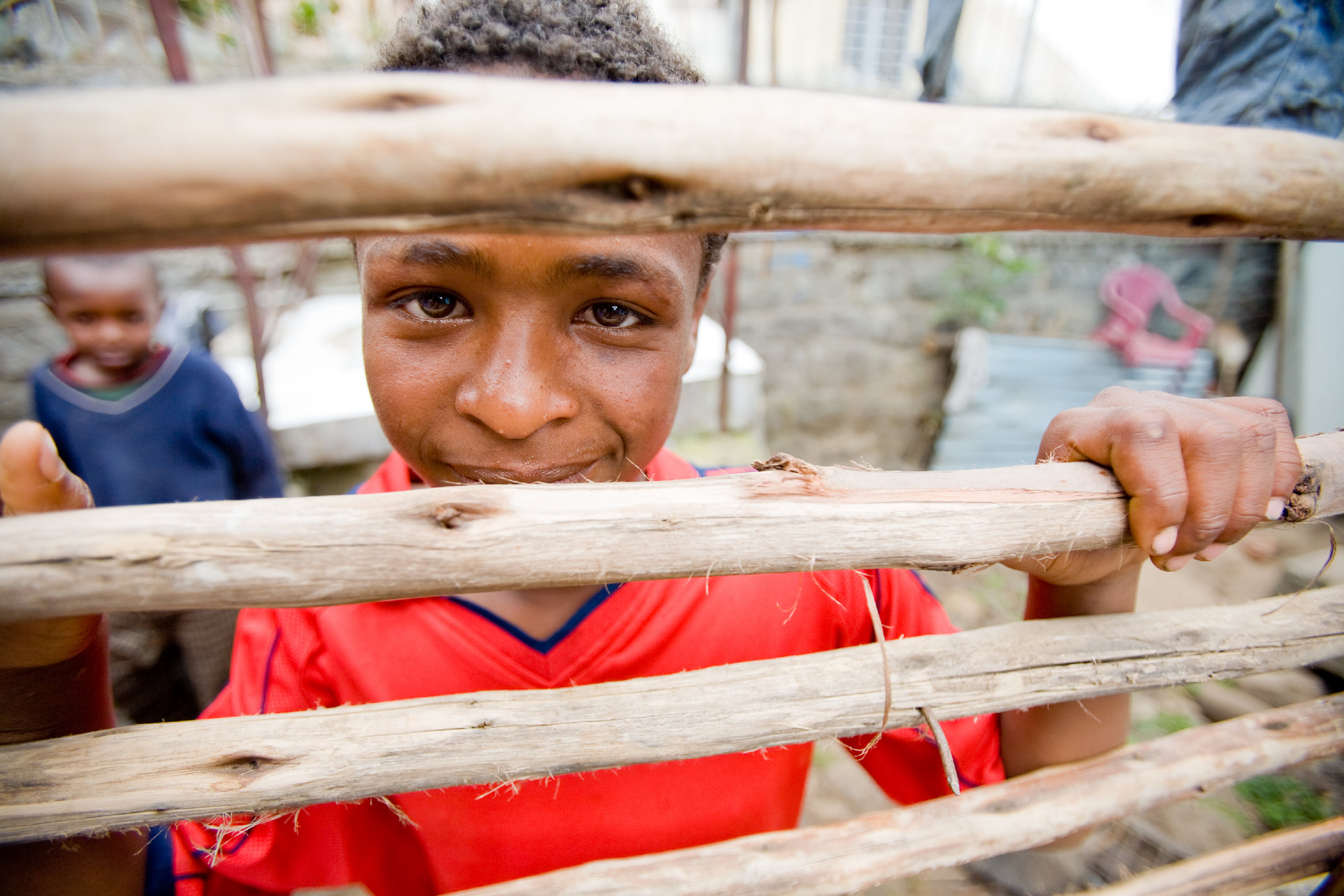 |
|
| Tamrot at the Drop-In Center where he accepted Christ |
Fitela felt the Holy Spirit prompting her to talk to one of the Drop-In Center boys, Yared, about Jesus. When she got up the nerve to pull Yared aside, she was surprised when two of the other Drop-In Center boys, Tamrot and Nati, asked to join the discussion. As it turned out, all three boys had been discussing what they had learned at the Drop-In Center and how they wanted to repent from their sins and follow Jesus. Long story short, all three of the boys accepted Jesus as Savior. Nega said it is obvious that these boys are changing. He said Tamrot is preaching to his family and friends. I am thrilled to see how God is working in all the phases of Onesimus from the Drop-In Center to family reintegration.
Foster Care Training:
 |
|
| (from left) Alex, Seblay, and Nega at Foster Care Training |
Nega, Alex (Ministry Coordinator), and Seblay (Social Worker) all participated in a foster care training last week. It was so fantastic to hear the excitement in Nega’s voice concerning foster care. For quite some time the concept of foster care seemed daunting to him and therefore to me, but this training brought it all into perspective. As they heard from Ethiopian organizations who were successfully using foster care for their children, hope for this developing phase for Onesimus began to creep in. By the end of the training all three Onesimus staff not only understood foster care better, but also embraced it as the obvious next step for the children in our Halfway Homes. They left the week with an activity plan for how Onesimus can begin implement foster care within the next 2-3 years. Kota Ganate News: The Kota Ganate Truck – Nega was thrilled to tell me that the Kota Ganate truck is loaded, which means it is that much closer to Ethiopian soil (it is being shipped from Dubai, where it was purchased due to the expense of purchasing a similar truck in Ethiopia). Nega said this is "Betam [very] Awesome" news, because the paperwork showing that it was loaded arrived before the bank had even finished its process. Even the bank representative was surprised. This means that the Kota Ganate Agriculture Project should have its truck soon.
 |
|
| Kota Ganate's truck - Thank you to all those who contributed! |
Love for Desse – It’s Not Easy
How do you love a child who will not love you back?
 |
|
| Desse in 2008 |
For me, this question conjures up images of Desse, a child I’ve known for going on four years now. As the original beneficiary for The Forsaken Children’s partner project, Children’s Home Ethiopia, I have loved Desse. Honestly, I have also hated him (Is that too honest?). You see, no matter what has been done for this little boy, he always goes back… Goes back to the streets… Goes back to the drugs… Goes back to running from the staff and me when he sees us on the streets looking for him.
| “I know love is a choice, but when he’s back the choice seems to be made for me. Then he’s gone just like before.” | |
And then, he always comes back. When he’s back, Desse is amazing (yes, he is a pain at times, but I’m speaking in general here.). He sings beautifully, he smiles a lot, he gives hugs, and he is so repentant. In those moments, love for Desse comes easy. I know love is a choice, but when he’s back the choice seems to be made for me. Then he’s gone just like before.
I have learned so much about myself when Desse leaves. I have learned how dependent I am on my feelings. I have learned how needy I am for love in return for my own. I have learned how unlike Jesus I am and it hurts. For a moment I hate Desse for that.
Fortunately, the hate has not persisted. With a little time and encouragement my heart softens again. Before this happens I usually make broad sweeping statements like, “he cannot be allowed to come back!” “He must learn from this mistake, let him feel the consequences.” No, these comments are not necessarily wrong or bad in and of themselves, but the heart motive behind them makes them wrong. They are not based in love, in true concern for Desse. They’re based in my hurt and my selfish desire to receive love. Until I have resolved to truly love Desse no matter what he does in return, I should not make such decisions about him and because of accountability, I don’t.
| “Desse is 1 of approximately 100,000 street children in Addis Ababa and Nega looks for and finds him… No matter what your opinion is of such an act you have to agree that it is mighty selfless.” |
In such an instance, my accountability is Nega, Director of Children’s Home Ethiopia. What a good person to keep me accountable. The man truly embodies what love is with the children he ministers to. When I think about his consistent response to Desse’s rebellion I am blown away. No, I don’t think Nega is perfect, but his heart is unmoved by Desse’s rejection. In 2008 Nega searched for and found Desse 15 different times after he had run away. Think about it. Desse is 1 of approximately 100,000 street children in Addis Ababa and Nega looks for and finds him. That’s like finding a needle in a haystack. No matter what your opinion is of such an act (maybe you think he’s wasting his time, or enabling Desse, or etc…), you have to agree that it is mighty selfless. It’s unconditional love if you ask me. Whether he stays off the streets or not, that love impacts Desse for an even greater purpose, for Christ.
I want to be more like Nega, don’t you?
The Way, The Truth, and The Life
Picture if you will a dirty older street boy about the age of 19 years. He’s a rough and tumble youth and the designated leader of a gang of street boys ranging in age from 11 to 19 years. This boy, we’ll call Abebe, gets all kinds of ideas in his head for his “little” group of followers. This week his idea revolves around a prostitute. Abebe decides one evening that he will bring a prostitute to their usual hangout and each of the boys can pay to have their turn with her. The price is set per boy and the protection of choice- a plastic bag.
This young girl, possibly a child herself, spends the evening allowing upwards of 15 boys violate her for 10 Ethiopian Birr a piece. (Today’s exchange rate is 13.5 Ethiopian Birr for every 1 US Dollars.) Do the math & you will see that she “earned” approximately 75 cents for each boy. That night she sold herself for $11.25 and 15 possible chances of contracting HIV/AIDS.
Folks, we aren’t talking about consenting adults! We’re talking about children- some only 11 years old. Innocence repeatedly lost! Lives constantly shattered! These kids consistently allow themselves to be abused and actively engage in abusing others. They see and do things that are absolutely unimaginable to us as adults.
This is a true story told to a CHE staff member by a drop-in center boy during a one-on-one session last week. This is the way of the street, the truth for hundreds if not thousands of boys and girls in Ethiopia, and the life that will most likely continue for their children and their children’s children.
Let’s put this into perspective for most of our contexts – these boys are supposed to be playing Little League, riding bicycles or skateboards, and pulling girls pony tails in school. The girls should be going on date nights with their dads, taking gymnastics, and dreaming of being teenagers.
Jesus answered, "I am the WAY and the TRUTH and the LIFE.” John 14:6
I have never believed more strongly in this scripture than I do today. Jesus is the ONLY way out for these children. Jesus is the ONLY truth that will set them free from the bondage of the streets. He offers the ONLY life that will change these patterns and help these children LIVE the way God intended a child to live.
Join us as we storm the gates of heaven on behalf of these children of Ethiopia. May God by his grace and mercy open their eyes to his truths, lift their bondage and set them free!
He will take pity on the weak and the needy and save the needy from death. He will rescue them from oppression and violence, for precious is their blood in his sight. Psalm 72:13-14
Love... A Choice?
 |
|
| Amonyesh at the Drop-In Center |
Do you know how some children are just lovable the first time you lay eyes on them? I have that experience a lot here in Ethiopia as I meet the children that CHE ministers to. There’s Begidu, who may possibly be the cutest little boy ever or Metu who instantly charms you with her smile and jovial personality. Love for them just came easy for me, despite some of their very unlovable behaviors.
There are other children though, who seem hard to love at first. Maybe it’s their appearance, or their expressions, or their defensiveness – I’m honestly not always sure why. One such child for me was Amonyesh. I remember the first time I met her. She came into the Drop-In Center one day in 2008 and wanted me to push her on the tire swing and I did not want to (I know, how childish!). I was already playing with some of the other children, but I decided to stop what I was doing and push her on the swing.
It was that way up until about a month ago; always choosing to show her attention and love despite not really wanting to. Then, one day in January she came up to me with her big smile and asked me to treat her already healed wound (a common occurrence at the Center, especially for Amonyesh) and something changed. I actually felt love for her. As I faux-treated her healed wound I noticed how sweet Amonyesh was and how funny she could be. I felt like I had been missing something the whole time I’d known her. I honestly do not know what changed other than the fact that I had persistently chosen to show her love despite not feeling like it and finally the feelings followed.
Just last week I got the chance to visit with Amonyesh’s mom and two sisters in their small one room home. Amonyesh told me that she wanted to be a doctor one day so she could help poor people in Ethiopia. I asked her what influenced this decision and her response surprised me. She said it was because of people, like me, who helped her with her wounds and when she was sick. All those times when I begrudgingly cleaned her minor (and I mean very minor) wounds really had impacted her. In that instant I had an ah-ha moment and the saying, “Love is not just a feeling, but it’s a choice,” finally made real sense to me. Thank God I had chosen to love Amonyesh when I had not wanted to, otherwise I would have missed out on finding her friendship and even playing a part in inspiring her to also love others.
First Things First
My wife, Karyn, asked me to blog about The Forsaken Children’s hopes for 2010, which I thought was a great idea. As I sat down to do that, thinking through all the Board meetings and strategizing, I got a little bogged down and decided I wanted to make this blog a little more personal, from my heart. I want to tell you about MY hopes for TFC in 2010. After an incredibly productive 2009, I am full of ideas regarding what could happen in this new year. My hopes revolve around one thing though, and that is making life worth living for the Ethiopian children I have gotten to know since moving to Ethiopia last year. I have come to the conclusion that focusing on ministry (sharing Jesus and teaching new believers how to follow him) is the key to seeing this happen. Keeping first things first. I don’t know if you have ever experienced this, but for me, being surrounded by extreme need constantly last year caused me to lose sight of the importance of ministry. What I mean is that I slowly began to focus more and more on fulfilling people’s physical needs rather than their spiritual needs. When Ashenafi, an Onesimus beneficiary who accepted Christ in early 2009, came to me, I didn’t think much about his spiritual health/growth, but rather I concentrated on things like the condition of his clothes, whether he was clean or not, did he look hungry?, etc… I know all those things are extremely important, but I also know that they will not last.
During my brief trip to the States over Christmas, I had the opportunity to clear my head a bit. As I processed through the past year I saw my tendency to focus on the practical and physical elements of my work in Ethiopia. I also remembered how sweet it was when I sat with Ashenafi during those first months of living here, and saw him weep as he accepted Jesus as his Savior. These integral elements of ministry – physical and spiritual provision – became competitors for me, physical often replacing spiritual. I saw my error was in dividing these two elements that must go hand in hand, and if either must be the champion as is the case sometimes, It must be spiritual provision, because it is the one lasting thing that exists in the absence of physical resources.
I have therefore come back to Ethiopia with a renewed excitement and commitment to ministry. As the foreigner here, I am mostly excited about the prospect of equipping Nega, Director of Onesimus, and his staff with the time and resources to be first and foremost ministers of Jesus Christ. I want to see 2010 filled with opportunities for them to share Jesus in strategic and effective ways with the community of children and extremely poor families they work with daily. This will provide the lasting change that this community needs more than anything.
Universal Children's Day
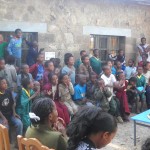 |
 |
Did you know November 20 was Universal Children’s Day? Universal Children’s Day was instituted by the United Nations to commemorate its adoption on November 20, 1959 of the Declaration of the Rights of the Child (DRC). The DRC states, among other rights, that all children have, wherever possible, the right to grow up in the care and under the responsibility of his parents, and, in any case, in an atmosphere of affection and of moral and material security. Ethiopia is far from seeing such rights observed for what I assume is the majority of its children, nonetheless November 20 was marked as a day to be focused on the rights of the children of its country. The challenging question that I asked myself was, “what will I do to further the rights of the children of Ethiopia and for that matter, the world?” I think we all need to ask that question of ourselves, especially those of us who work or support causes that work with and for the children at risk in our world.
On another note, Karyn, Jack, McLaine, and I got to celebrate Universal Children’s Day with Children’s Home Ethiopia’s staff and beneficiaries. We had so much fun as we watched the children play games, compete in silly competitions, give impromptu speeches, sing songs, listen to a special message from CHE friend Elias, and of course eat cookies and drink punch. I particularly enjoyed watching Begidu cheer so hard for his friend in the banana eating contest, that at one point I thought he was going to fall over.
I love how CHE’s compound becomes a haven for these children who have close to nothing. It’s like they leave their worries at the gate and know that this place is for them. I believe each of these children and the many others who have no such gate to pass through in Ethiopia deserve such a place. A place where they can be kids and laugh, play, be goofy, and simply have it be about them for a change. I know many of you believe this too and act on your desire to see the rights of children fulfilled in this world – some through your partnership with TFC. Thank you for supporting children’s rights!
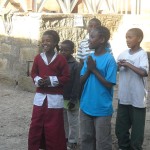 |
 |
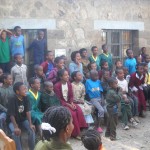 |
Strategy
Last Saturday Karyn and I participated in the first meeting of Children’s Home Ethiopia’s strategic planning for the next 3 years. I was honored to be a part of such an amazing group of people. Present were six CHE beneficiaries, six mothers who are on the parent committee for the SAFE Project, all the CHE staff, the chairman of CHE’s Board, and two representatives from The Forsaken Children (Karyn and me). It was exciting to hear all the ideas that this diverse group had swimming around in their minds. They saw problems I never knew existed and presented solutions that were profoundly insightful. I was reminded on that day of the importance of pure knowledge. Why do I call the information exchanged in this meeting pure knowledge? Because it was not given by trained experts, read from any book, or derived from scientific calculations. Rather, it came straight from the people living, working, and experiencing life in the area of Addis Ababa where CHE operates. These are the true experts of what problems exist there and of the potential solutions for these problems.
Next weekend the strategizing will continue over a three day period. I am eager to participate and see how the strategic planning shapes the way the CHE staff, volunteers, beneficiaries, and especially I approach the challenges and opportunities before us
How Working in Ethiopia Redefines What's Important About Families
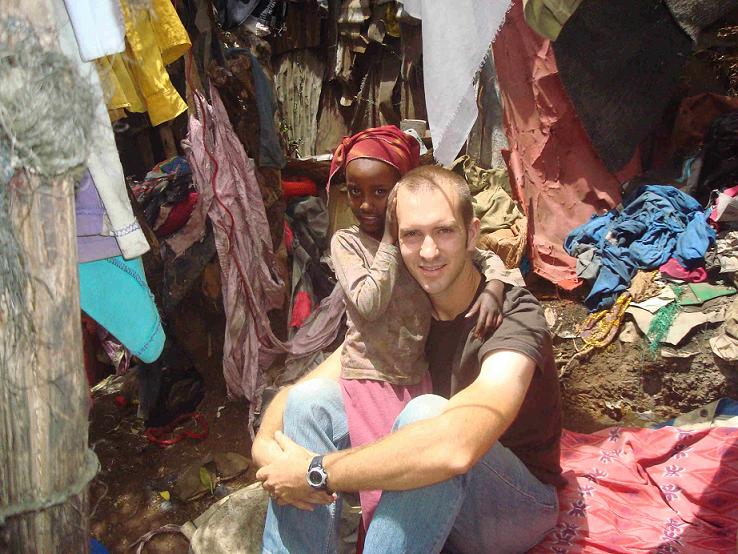 |
|
| Joe Bridges sitting with Sarah at her home |
Working and living within the confines of Ethiopia’s impoverished reality, I have had to clarify what I believe is important about families.
You see, as an American I have heard of extreme poverty disqualifying parents as fit guardians, sending their children into government care.
Now as an American living in Ethiopia and working to keep children in families I have had to wrestle with this viewpoint, because most of these children’s guardians are extremely poor – some poorer than I ever imagined possible.
So, do I disqualify these guardians based on their income level?
If I did there would be about 100 children without guardians just from Children’s Home Ethiopia alone. To illustrate this point, let me tell you about Hanna and Sarah…
Hanna, 11, and Sarah, 6, are sisters who come to Children’s Home Ethiopia’s Drop-In Center. What’s unique about Hanna and Sarah is that they have both a father and a mother who are together (this is usually not the case for CHE’s beneficiaries). Even more uncommon is that they live with these parents rather than on the streets.
I was able to visit Hanna and Sarah’s home about a month ago. I sat under a plastic canopy directly across from the entrance to their home – a plastic house that is about 4 feet tall and covers approximately 6 square feet of space. The smells of what I believe came from rotting food and nearby public toilets were nauseating.
With flies swarming around us, the girls sat right beside me in delight as their father explained their family’s history. Amidst the stories of living on the streets, fighting with police over places to reside, and other unbelievable events I heard one thing that gave me hope for the girls: Hanna and Sarah’s parents had been together for over 12 years and all 3 of their children (Hanna and Sarah have an older brother) lived at home, albeit a plastic one.
Of course there is much more research and work to be done with Hanna and Sarah’s family. But will CHE take the girls away because of poverty? No, but rather we will pray and work to keep this family intact as it has been for over 12 years and also look to provide solutions for their economic crisis.
In America I am quite sure that Hanna and Sarah would have been pulled out of their home after such a visit, but in Ethiopia this is not an option.
So, does this change what is important about a family in my mind?
I think it has to because of where I live and the kind of work I do here. For me, what is important and necessary for a family is a commitment to care for one another even in the midst of difficult situations, a willingness to do whatever it takes to stay together in the most trying times, and a decision by the parental figures to love their children no matter what. And at tihs point Hanna and Sarah’s family is hitting hitting the nail right on the head.
An Answer to My Prayer
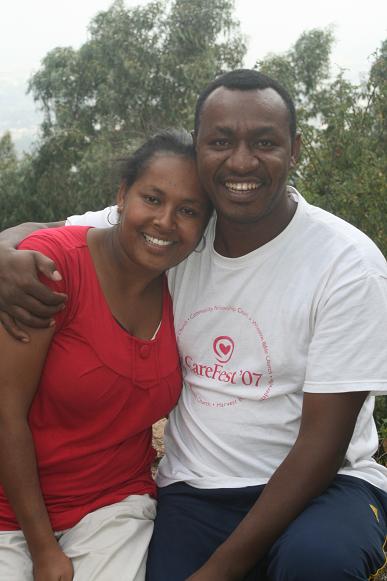 Today, at Children’s Home Ethiopia’s Drop-In Center for street children, we celebrated a very special birthday – Nega Meaza’s, Director and Co-Founder of CHE.
Today, at Children’s Home Ethiopia’s Drop-In Center for street children, we celebrated a very special birthday – Nega Meaza’s, Director and Co-Founder of CHE.
It started with the staff and children secretly preparing a special breakfast of difo dabo (a cultural bread that Nega loves), along with cookies, tea, and a coffee ceremony (which includes popcorn!).
Nega was brought into the classroom and surprised with 20 children singing (actually it was more like screaming :-) ) “Happy Birthday to You!” over and over again.
Two candles graced the top of the difo dabo revealing Nega’s young age of only 35.
It was truly a heartwarming experience to witness this celebration as most of these children look to Nega as a father figure. Imagine 20 children honoring you with their songs, attention, and obvious affection – what an incredibly special birthday gift!
As I think of Nega, I am so truly honored to be his friend and co-worker. His dedication to the children under his care is second to none - completely unlike anything I have ever experienced.
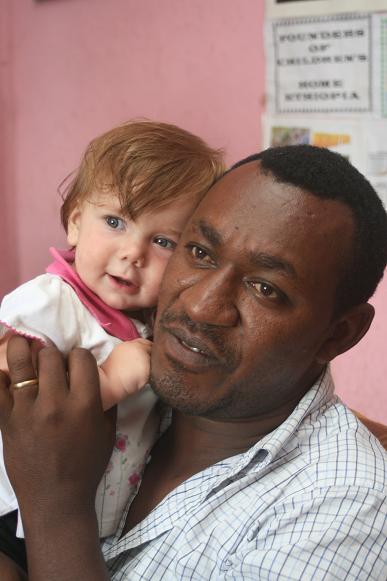
And despite the overwhelming numbers of children before us, tinish (little) funding, and exhaustive needs that are ever-present, Nega perseveres – not for himself and not for his reputation, but solely for his love for children and his obedience to God.
Today I am struck with the realization that Nega is a profound part of the answer to my prayer for the street children of Ethiopia (click here to see last week's post).
It's funny. Last week I was wondering how street children would experience the God-intended parental love they deserve. And now here he is right under my nose.
So now I revise my prayer and ask…
God please provide more Negas for Ethiopia!
A Mother’s Love
Recently Karyn, Jack (our 2 year old), McLaine (our 11 month old), and I were blessed by a timely visit by my mom, Bonnie. You see, Karyn had just had surgery – a scary thing when you are so far from home and family – and we were facing her recovery with two young children to boot. Needless to say we were feeling a bit overwhelmed.
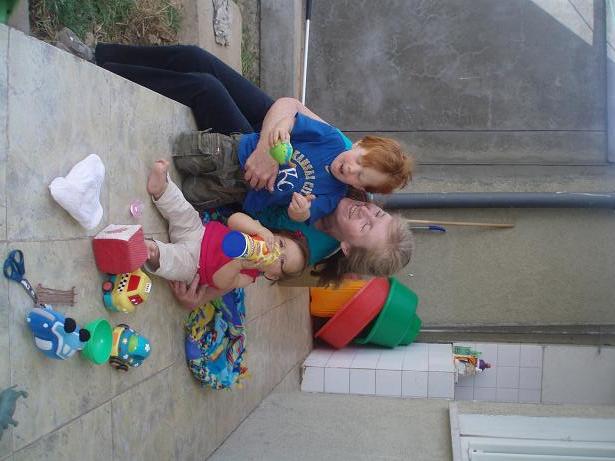 |
| Mom with Jack and McLaine at home in Addis |
And then we received a call from mom. She said, “I’ve got my ticket to come and now all I have to do is go to Washington D.C. to get a last minute passport.” There was much rejoicing within our household that day.
Mom arrived in Addis Ababa on May 2, 2009 and we were able to enjoy her visit and her help for an entire month!
As I thought about mom and her impractical, yet loving, last minute decision to come to Ethiopia to help her family, I realized how blessed I am. I believe being loved so tangibly is not only a privilege but it’s also how God intended it to be. I have experienced my mother and my father’s love – their deep, unconditional love – and believe I am who I am today partly because of it. Even my understanding of God owes credit to my parents’ love of me.
I work with and am approached by children everyday here in Addis who have no such love in their lives. I am heartbroken when I consider that these children and thousands more in Addis Ababa alone are living lives void of this God-intended parental love.
Today I have no answers to give that solve this overwhelming tragedy, but I do have a prayer…
Father God, love the forsaken children of this country so deeply, so tangibly that they miraculously understand what it means to have a mother’s love. I ask that your presence will penetrate the dark streets and allies that many of these children sleep on here in Addis Ababa. You are their father and their mother. AMEN
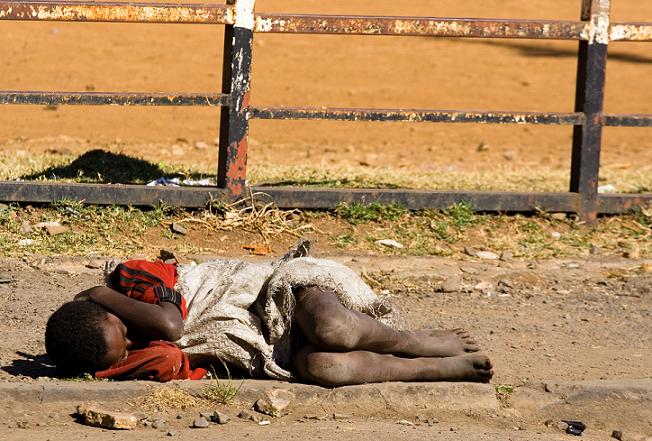 |

